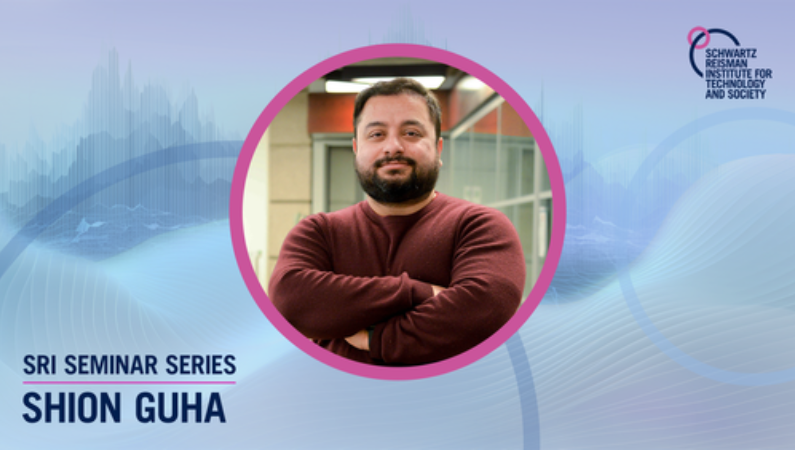

Our weekly SRI Seminar Series welcomes Shion Guha, an assistant professor at the University of Toronto’s Faculty of Information and Department of Computer Science, director of the Human-Centered Data Science Lab, and a 2023–25 Schwartz Reisman faculty fellow.
Guha’s research interests are broadly in the nascent field of human-centered data science, which he helped develop, including co-authoring the textbook Human-Centered Data Science: An Introduction (MIT Press, 2022). He is very interested in algorithmic decision-making, especially in public services such as higher education, child welfare, and healthcare, as well as the intersection between AI and public policy. In this talk, Guha will explore how predictive risk models are used in government agencies, deconstructing and interrogating what “risk” actually means in these systems and providing provocative directions for how to move beyond existing approaches.
“Deconstructing risk in predictive risk models”
Predictive risk models (PRM) have become commonplace in many government agencies to provide optimal data-driven decision-making outcomes in high-risk contexts such as criminal justice, child welfare, homelessness, and immigration. While such technology continues to be acquired and implemented rapidly throughout the government because of the perceived benefits of cost reductions and better decision-making outcomes, recent research has pointed out several issues in how PRMs are developed. Notably, existing risk assessment approaches underlie much of the training data for these PRMs. But what exactly are these PRMs predicting? In this talk, I use empirical studies in the context of child welfare to deconstruct and interrogate what “risk” in PRMs actually means and provide provocative directions for the community to discuss how we can move beyond our existing PRM development approaches.
Shion Guha is an assistant professor at the University of Toronto, where he is cross-appointed between the Faculty of Information and Department of Computer Science. Guha is the director of the Human-Centered Data Science Lab and is part of the broader Critical Computing at U of T research community.
Guha’s research interests are broadly in the nascent field of human-centered data science, which he helped develop, including co-authoring the textbook Human-Centered Data Science: An Introduction (MIT Press, 2022). He is very interested in algorithmic decision-making, especially in public services such as higher education, child welfare, and healthcare, as well as the intersection between AI and public policy.
Guha is the recipient of a 2019 Way-Klingler Early Career Award, 2022 Connaught New Researcher Award, and 2023–25 Schwartz Reisman Institute for Technology and Society Faculty Fellowship.
To register for the event, visit the official event page.
The SRI Seminar Series brings together the Schwartz Reisman community and beyond for a robust exchange of ideas that advance scholarship at the intersection of technology and society. Seminars are led by a leading or emerging scholar and feature extensive discussion.
Each week, a featured speaker will present for 45 minutes, followed by an open discussion. Registered attendees will be emailed a Zoom link before the event begins. The event will be recorded and posted online.